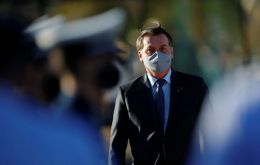MercoPress. South Atlantic News Agency
Tag: Fake News
-
Friday, July 3rd 2020 - 09:07 UTC
Bolsonaro pledges to veto a bill regulating fake news: “I favor total freedom of the media”

Brazil’s President Jair Bolsonaro said he would veto a bill regulating fake news, which has also been criticized by social media companies such as Facebook and Twitter, if it comes to his desk from Congress in its present shape.
-
Friday, June 19th 2020 - 11:46 UTC
Twitter adds “manipulated media” on a video from Trump's doctored news clip

Twitter Inc added a ‘manipulated media’ label on a video posted on U.S. President Donald Trump’s Twitter feed on Thursday that showed a doctored news clip with a misspelled banner flashing “Terrified toddler runs from racist baby.”
-
Monday, June 15th 2020 - 19:01 UTC
Media called on the European Commission to combat disinformation on internet

Broadcasters, publishers and journalists called on the European Commission on Monday to implement “much stronger measures” to combat disinformation on Internet platforms such as Google and Facebook.
-
Thursday, June 11th 2020 - 12:52 UTC
EU accuses Russia and China of “unprecedented” Coronavirus “infodemic”

China and Russia were blamed for spewing out false and misleading online information about Covid-19 in a European Union report that seeks to stem the “unprecedented” spread of fake news amid the pandemic.
-
Monday, May 4th 2020 - 07:32 UTC
Press Freedom provides the antidote for the pandemic of misinformation

Journalists and media workers are crucial in helping us make informed decisions. As the world fights the COVID-19 pandemic, those decisions can make the difference between life and death.
-
Tuesday, March 3rd 2020 - 08:34 UTC
Taipei accuses Beijing of “using external problems to relieve domestic pressure”

China is pressuring Taiwan with “provocative” air force maneuvers near the island and spreading fake news to sow discord during the coronavirus outbreak, security sources and government officials in Taiwan say.
-
Wednesday, October 30th 2019 - 09:18 UTC
EC warns Facebook, Google, Twitter: tackle fake news or face regulatory action

Facebook, Google and Twitter must do more to tackle fake news or face regulatory action, the European Commission said on Tuesday.
-
Friday, September 27th 2019 - 09:51 UTC
Twenty countries sign an agreement to stop spread of fake news

Twenty countries, including France, Britain, and India, signed an agreement at the UN on Thursday that aims to stop the spread of fake news online. The signatories, which also included South Africa and Canada, committed to promoting “independently reported, diverse and reliable” information on the internet, under an accord initiated by Reporters Without Borders (RSF), a press freedom watchdog.
-
Monday, September 9th 2019 - 08:52 UTC
Under BBC initiative international media signs initiative to fight misinformation

A dozen international media organizations have signed up to a new initiative launched by the BBC to fight misinformation. The French news agency AFP said in a statement it has joined the BBC initiative, alongside organizations such as the European Broadcasting Union, the Financial Times, First Draft, The Hindu, the Wall Street Journal, CBC/Radio Canada, Reuters and the Reuters Institute, as well as partners Facebook, Google and Microsoft.
-
Monday, July 1st 2019 - 09:59 UTC
Uruguay: No surprises in a primary with a record of candidates

In a primary election full of new faces and overshadowed by accusations of “dirty” campaigns, there were no surprises in the results of the internal elections of Uruguay's main political parties, according to the data of the pollsters. Daniel Martínez (Frente Amplio), Luis Lacalle Pou (National Party) and Ernesto Talvi (Colorado Party) will represent the three parties with the greatest adhesion in the country, starting a new stage in the national elections in October.
